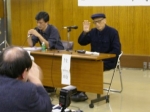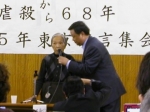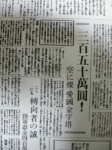21 February 2006
Halls of Montezuma
I just recently bought the CD that contains the song of the below.
From the Halls of Montezuma
To the Shores of Tripoli;
We will fight our country's battles
In the air, on land and sea;
First to fight for right and freedom
And to keep our honor clean;
We are proud to claim the title
of United States Marine.
Very rythmical and powerful song, isn't it?
Then I want to ask,
What are they doing in Iraq?
Fight for right and freedom?
To keep your honor CLEAN?
See this!
This is just like Japanese troops in China in 1930's.
21:00 Posted in Music | Permalink | Comments (0) | Tags: political issues, Military
04 February 2006
No more beef
I decided not to eat beef in my life. I do not eat steak or sukiyaki any more.
Beef are delicious but also very dangerous these days because of mad cow disease.
US beef imports to Japan is currently suspended now.
Actually, mad cow disease is not the only reason I stopped eating it. Raising cattles for meat consumes so much energey and burdens our planet's environment. Cutting forest trees, Grazing the filed. Raise cattles only for milk! Let them eat only grass, not their own meat to cut cost.
Americans should eat less beef and eat more fish like we do!
15:20 Posted in US-Japan relationship | Permalink | Comments (0) | Tags: political issues, environmentalism
11 December 2005
Met with the survivors of Nanking Masscre
Yesterday I went to the meeting to hear the testimonies of Nanking Masscre survivors. Two people showed up and talked about their experience in ther villages near the former Chinese capitol, Nanking, December 1937. They are very old people. One of them is 85 year-old man, and the other is 77 year-old woman. They were child at the time the masscre occured.
Japanese army came into their villages. The stories they told the audience (mostly Japanese) were horrible. Their parents were killed in front of them. 
The old man's villagers were gathered on the ground and shot by machine-guns. 23 of them were all together killed and later stabbed by the swords. The old man was saved but sexually abused by the soldiers.
 The old lady's mother was shot to death in front of her and she was also shot in her hand. Her life had changed greatly since then. She had to be married to someone for her life at the age of 12 or 13.
The old lady's mother was shot to death in front of her and she was also shot in her hand. Her life had changed greatly since then. She had to be married to someone for her life at the age of 12 or 13.
After the meeting I walked past the Parliament Building. The meeting was held near the parliament. It was very peaceful place. See the picture in the Photo Gallery. The contrast between the stories of the survivors and the landscape of the capitol was so big.
The reality was they are co-related. That place made a decision to dispatch troops to China at that time and caused them such painful memories. Yet the goverment has not compensated the victims. Some of the politicians expressed apologies but always after that, some of the cabinet members said something to turn down. Current prime minister visited war crimials' shrine. Their stance is so inconsistent.
Some so called right wingers are trying to rewrite the history. They believe nothing bad was done by Japanese army. They think or want to think the atrocities were made up by Chinese.
This nation is on the crisis. Now is such an important time to strengthen relationship with neighboring Asian nations but top politicians who have to place importance on national interests are deteriorating that. Unless Japan reviews and compensates the past atrocities, we will have no future.
18:00 Posted in China | Permalink | Comments (0) | Tags: war, political issues, history
04 November 2005
Japanese media's role in supporting atrocities of WW2

60 years have passed after Japan’s surrender in World War II, the citizens of Japan are able to speak about how much pain and suffering that they experienced as a result of the war, yet we are unable to discuss how much pain and suffering that Japan caused the citizens of other nations. To discuss such things one runs the risk of being labeled masochistic. Those in mass media willing to report upon the country’s responsibility for the atrocities that occurred during the war are also few and far between. Why do they not wish to cover such stories? One might reason that this is because the media reflects public opinion, but this is not the entire explanation. Rather it is also because the media itself bears a portion of blame.
The photo shows an article in the August 5, 1937 edition of the Asashi Newspaper.The headline reads, “3.5 Million Yen! A Glorious Monument to Patriotism”. The article contains a report on the collection of 3.5 million yen in donations and introduces some of the donors following the Asahi Newspaper’s collection of donations for the production of military aircraft. Even a mother and her child in elementary school are featured among the donors. However, the reality is that the military aircraft produced from these donations was flown to China and used to bomb such cities as Chongqing resulting in the slaughter of innocent civilians. Many people would probably be surprised to hear that the Asahi Newspaper collected donations for production of military aircraft. Considering that the newspaper is known for being a large liberal media outlet which often covers Japan’s accountability for war crimes such as the issue with so-called “comfort women” and the Nan king Massacre. The Asahi Newspaper may now even seem pacifist with its recent critical position towards the Japanese Self Defense Forces participation in Iraq, but this was not the case just prior to World War II. In fact, it may be more accurate to say that this was not the case for the period between the Manchurian Incident and the end of the war. Prior to the Manchurian Incident, which thrust Japan into the messy quagmire of the 15 year war to follow, the Asahi Newspaper objected to the dispatch of troops to Siberia during the Taisho Period (1911-1926) and further took the position of moderates who were in favor of a peaceful resolution without the use of military force to protect Japan’s interests in Manchuria.
Why then did this position change? It is generally understood that this change was due to the boycotts that occurred after the outbreak of the Manchurian incident in 1931. As a public weary of the economic recession leaned towards military fervor, Asahi found that it’s stance contrary to other media and not in sync with military views resulted in a drop in its sales. After this, the Asahi Newspaper editorial policy changed drastically.
Prior to the war, it is generally said that newspapers, magazines, and other media could not criticize the military because they were subject to intense scrutiny by authorities and laws limited their freedom of speech. However, this was not the only reason. Mass media of this era not only failed to criticize, it became a backer in a sense fanning the flames of war. It chose to support the war in an effort to increase circulation and sales. In other words, it did so in tune with the public opinion of the time which was in favor of war. This same phenomenon is at work today. Great example is US media's reports on wars in Afghanistan and Iraq.
The Frankfurt School, established by Jewish Scholars who defected from Nazi Germany, is critical of mass media which takes this position. It says that the press and mass media should above all take a neutral and impartial position and should not curry favor with emotional public opinion. It is thought that the spread of Nazism in Nazi Germany was due to the bolster support provided by mass media. At that time it appeared that the papers’ sales grew and stimulated national opinion, but in fact mass media lost sight of the all important truth and dragged society in an utterly inane direction Germany, a defeated nation like Japan, chose to abolish all of the newspapers which bolstered the Nazi regime. Yet in Japan, the mass media of the prewar period survived. Moreover, it has yet to apologize to the public for the role that it played in World War II, and to this day the press club system symbolic of the cozy relationship between mass media and government officials still thrives. In fact, this may be why none of the Japanese newspapers are willing to own up to the past. It is for this reason that we, along with mass media, are unable to fully own up to our accountability and the circumstances of Japan’s defeat in the war.
On this, the sixtieth year after the end of the war, shouldn’t the media take this chance to recognize its past role in the tragedies of World War II to and apologize to the Japanese public? Moreover, shouldn’t it use this as an opportunity to apologize to the citizens of all of the countries in Asia which suffered as a result of invasions by Japan? In addition, it is imperative that we, as the passive readers and the consumers of mass media, use this opportunity to reflect on history and reexamine ourselves. We are now in the age of the internet in which media is not just limited to newspaper, television, and radio. It is time to broaden our intellect to fight back against the prevailing mass media that contorts the truth to cater to the masses. Furthermore, it is essential that we endeavor to promote the advancement of media that no matter the circumstances always meets the truth head on.
21:10 Posted in Media | Permalink | Comments (1) | Tags: political issues, history, Japan





